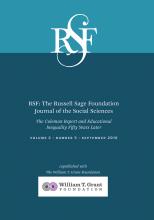Research Article
Open Access
A New Framework for Understanding Parental Involvement: Setting the Stage for Academic Success
Angel L. Harris, Keith Robinson
RSF: The Russell Sage Foundation Journal of the Social Sciences September 2016, 2 (5) 186-201; DOI: https://doi.org/10.7758/RSF.2016.2.5.09
Angel L. Harris
aProfessor of sociology and director of the Program for Research on Education and Development of Youth at Duke University
Keith Robinson
bResearcher (most recently with the University of Texas) now unaffiliated

REFERENCES
- ↵
- Ainsworth, James W
- ↵Alexander, Karl, Doris Entwisle, and Linda Olson. 2014. The Long Shadow: Family Background, Disadvantaged Urban Youth, and the Transition to Adulthood. New York: Russell Sage Foundation.
- ↵Bowles, Samuel, and Herbert Gintis. 1976. Schooling in Capitalist America: Educational Reform and the Contradictions of Economic Life. New York: Basic Books.
- ↵
- ↵Coleman, James S., Ernest Q. Campbell, Carol J. Hobson, James McPartland, Alexander M. Mood, Frederick D. Weinfeld, and Robert L. York. 1966. Equality of Educational Opportunity. Washington: U.S. Department of Health, Education, and Welfare, Office of Education.
- ↵
- Comer, James P
- ↵
- Crocker, Jennifer, and
- Brenda Major
- ↵
- ↵
- Desimone, Laura
- ↵
- Domina, Thurston
- ↵
- Duncan, Greg J., and
- Willard L. Rodgers
- ↵
- Epstein, Joyce L
- ↵
- ↵Freeman, Catherine, Benjamin Scafidi, and David L. Sjoquist. 2005. “Racial Segregation in Georgia Public Schools, 1994–2001: Trends, Causes, and Impact on Teacher Quality.” In School Segregation: Must the South Turn Back? edited by John Charles Boger and Gary Orfield. Chapel Hill: University of North Carolina Press.
- ↵
- ↵
- Hango, Darcy
- ↵
- Hanushek, Eric A.,
- John F. Kain, , and
- Steven G. Rivkin
- ↵Harris, Angel L. 2011. Kids Don’t Want to Fail: Oppositional Culture and the Black-White Achievement Gap. Cambridge, Mass.: Harvard University Press.
- ↵Hart, Betty, and Todd R. Risley. 1995. Meaningful Differences in the Everyday Experience of Young American Children. Baltimore: Paul H. Brooks Publishing.
- ↵
- Hoge, Dean R.,
- Edna K. Smit, , and
- John T. Crist
- ↵
- Izzo, Charles V.,
- Roger P. Weissberg, ,
- Wesley J. Kasprow, , and
- Michael Fendrich
- ↵
- Jackson, C. Kirabo
- ↵
- Jeynes, William
- ↵Lareau, Annette. 2003. Unequal Childhoods: Class, Race, and Family Life. Berkeley: University of California Press.
- ↵Lewis, Amanda E., and John B. Diamond. 2015. Despite the Best Intentions: How Racial Inequality Thrives in Good Schools. New York: Oxford University Press.
- ↵Lucas, Samuel Roundfield. 1999. Tracking Inequality: Stratification and Mobility in American High Schools. New York: Teachers College Press.
- ↵
- Marsh, Herbert W
- ↵Massey, Douglas, and Nancy Denton. 1993. American Apartheid. Cambridge, Mass.: Harvard University Press.
- ↵
- Mau, Wei-Cheng
- ↵
- McNeal, Ralph B., Jr.
- ↵
- Morgan, Stephen L., and
- Jai Mehta
- ↵
- Muller, Chandra
- ↵
- Muller, Chandra
- ↵Odden, Allen R., and Lawrence O. Picus. 2007. School Finance: A Policy Perspective. New York: McGraw-Hill.
- ↵
- Osborne, Jason W
- ↵
- Pomerantz, Eva,
- Elizabeth Moorman, , and
- Scott D. Litwack
- ↵Robinson, Keith, and Angel L. Harris. 2014. The Broken Compass: Parental Involvement with Children’s Education. Cambridge, Mass.: Harvard University Press.
- ↵Rosenberg, Morris. 1979. Conceiving the Self. New York: Basic Books.
- ↵
- Rosenberg, Morris,
- Carmi Schooler, ,
- Carrie Shoenbach, , and
- Florence Rosenberg
- ↵
- Schulting, Amy B.,
- Patrick S. Malone, , and
- Kenneth A. Dodge
- ↵
- Seccombe, Karen
- ↵
- Steele, Claude M
- ↵Stein, Melanie R., and Ron J. Thorkildsen. 1999. Parental Involvement in Education: Insights and Applications from the Research. Research Practitioner Series. Bloomington, Ind.: Phi Delta Kappa International.
- ↵
- Sui- Chu, ,
- Esther Ho, , and
- J. Douglas Willms
- ↵Tyson, Karolyn. 2011. Integration Interrupted: Tracking, Black Students, and Acting White After Brown. New York: Oxford University Press.
- ↵Wilson, William Julius. 1987. The Truly Disadvantaged: The Inner City, the Underclass, and Public Policy. Chicago: University of Chicago Press.
- ↵Wilson, William Julius. 1996. When Work Disappears: The World of the New Urban Poor. New York: Knopf.
- ↵
- Zellman, Gail L., and
- Jill M. Waterman
In this issue
A New Framework for Understanding Parental Involvement: Setting the Stage for Academic Success
Angel L. Harris, Keith Robinson
RSF: The Russell Sage Foundation Journal of the Social Sciences Sep 2016, 2 (5) 186-201; DOI: 10.7758/RSF.2016.2.5.09





